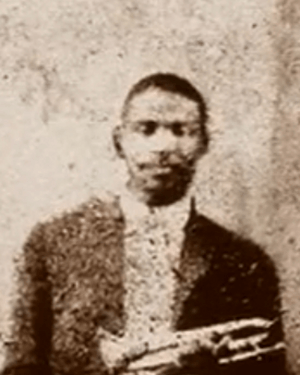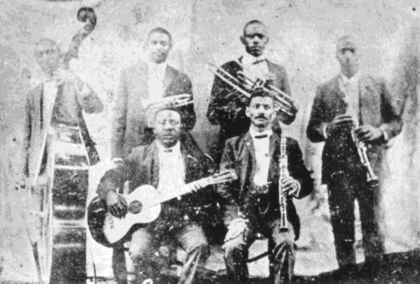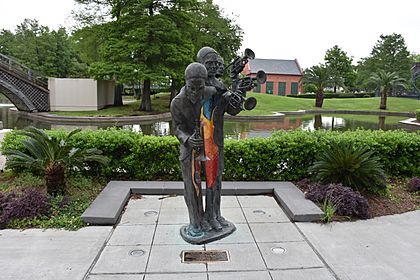Buddy Bolden facts for kids
Quick facts for kids
Charles Buddy Bolden
|
|
|---|---|
 |
|
| Background information | |
| Birth name | Charles Joseph Bolden |
| Born | September 6, 1877 New Orleans, Louisiana, U.S. |
| Died | November 4, 1931 (aged 54) Jackson, Louisiana, U.S. |
| Genres | |
| Occupation(s) | Musician |
| Instruments | Cornet |
| Years active | 1890's–1907 |
Charles Joseph "Buddy" Bolden (born September 6, 1877 – died November 4, 1931) was an African American cornet player. Many people who knew him thought he was very important. They believed he helped create a new style of music in New Orleans. This music was a type of ragtime or "jass," which later became known as jazz.
Contents
Buddy Bolden's Early Life
Buddy Bolden was born in New Orleans in 1877. His father, Westmore Bolden, worked as a driver. His mother was Alice Harris. When Buddy was six years old, his father passed away. After that, he lived with his mother and other family members. It is believed he went to Fisk School in New Orleans.
Buddy Bolden's Music Career
Buddy Bolden was known as "King" Bolden. His band was very popular in New Orleans from about 1900 to 1907. People knew him for his loud sound and amazing ability to make up music on the spot. His unique style influenced many younger musicians.
Many early jazz musicians said that Bolden and his band started what we now call jazz. The word "jazz" was not common until after Bolden stopped playing music. Some even call Bolden the "father of jazz." He made ragtime music more free and added blues music to it. Bolden's band was one of the first to use brass instruments to play the blues. He also took ideas from gospel music he heard in churches.
Bolden did not copy other cornet players. He played music he heard "by ear" and made it his own. He mixed ragtime, church music, marching band music, and country blues. He changed how a typical New Orleans dance band was set up. This made it better for playing the blues. String instruments became the rhythm section. Clarinets, trombones, and Bolden's cornet played the main tunes. Bolden was famous for his strong, loud, and "wide open" playing style. Other early jazz musicians like Joe "King" Oliver and Freddie Keppard were inspired by him.
One of Bolden's most famous songs was "Funky Butt." It was later known as "Buddy Bolden's Blues." This song was one of the first to use the idea of "funk" in popular music. The name "Funky Butt" referred to the smell from a crowded room of people dancing closely.
Bolden also created something called the "Big Four." This was a new rhythm for marching band music. It gave early jazz more room for musicians to improvise. The "Big Four" was the first bass drum pattern that was not just a simple march beat.
Later Life and Health
In 1907, when Bolden was 30, he became very unwell. He was admitted to a hospital in Jackson, Louisiana, where he stayed for the rest of his life. He passed away on November 4, 1931.
Stories and Legends About Bolden
Many stories are told about Buddy Bolden. It can be hard to tell what is true and what is just a colorful myth. For example, stories that he was a barber or that he published a gossip newspaper are not true.
Tributes to Buddy Bolden
Music and Awards
- Duke Ellington honored Bolden in his 1957 music piece A Drum Is a Woman.
- The song "Funky Butt," also known as "Buddy Bolden's Blues," has been played by many artists. These include Dr. John and Hugh Laurie.
- "Hey, Buddy Bolden" is a song on the album Nina Simone Sings Ellington.
- Wynton Marsalis talks about Bolden and plays a song called "Buddy Bolden" on his album Live at the Village Vanguard.
- The Buddyprisen is a top award for jazz musicians in Norway. It is named after Buddy Bolden.
- The band Hop Along wrote "Buddy in the Parade" as a tribute.
- Malachi Thompson recorded Buddy Bolden's Rag in 1995.
Buddy Bolden's Family
Bolden married Hattie Oliver. They had a son named Charles Joseph Bolden, Jr., born on May 2, 1897.
His great-grandson, Sammie "Big Sam" Williams, is also a musician in New Orleans.
Images for kids
See also
 In Spanish: Buddy Bolden para niños
In Spanish: Buddy Bolden para niños
 | Leon Lynch |
 | Milton P. Webster |
 | Ferdinand Smith |






